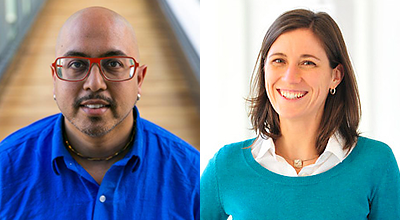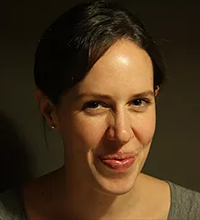The University of Washington is preparing to welcome outstanding new faculty hires who will bolster its reputation as a center of human-computer interaction research and teaching. Two of the impending arrivals, Jennifer Mankoff and Jon Froehlich, will join the Allen School faculty in advancing solutions to society’s greatest challenges, focusing on accessibility, education, health, sustainability, and more.
Jennifer Mankoff will join the Allen School as the Richard E. Ladner Endowed Professor in Computer Science & Engineering. She is currently a Professor in Carnegie Mellon University’s Human Computer Interaction Institute, where she leads the Make4All Lab. Previously, Mankoff was a member of the faculty in Electrical Engineering & Computer Science at the University of California, Berkeley.
Mankoff’s research combines empirical methods and technical innovation to solve problems related to accessibility, health, and sustainability. Most recently, her work has focused on 3D printing and its potential for creating personalized assistive technologies for people with disabilities.
For example, Mankoff and her colleagues have shown that a 3D printed physical interface can augment a screen reader and improve interaction speed by a third. This do-it-yourself (DIY) theme is carried over into her work with e-NABLE, a collaborative effort to engage volunteers and clinicians in the design and fabrication of upper-limb assistive technologies. Mankoff’s assistive technology work also extends beyond fabrication. For example, she and her colleagues have explored navigation aids for the blind, and mobile sound capture and transcription tools for the deaf.
As is the case with a lot of accessibility research, Mankoff’s people-centric approach to technology and novel use of 3D printing will wind up benefiting everybody. Mankoff has studied and created solutions for addressing uncertainty in measurement during 3D printing, attaching adaptations to everyday objects (Encore and Reprise) and prototyping custom assistive technologies. Another stream of work aims to explore more natural materials, including embedding textiles in 3D printing, creating knitted objects programmatically, and printing using layers of fabric.
Mankoff’s work also extends to chronic illness. She has explored the impact of chronic disease on quality of life, predictors of trust in peer versus professionally produced health content, visualization techniques for infant oxygen monitoring, and the design of both mobile and web tools for managing chronic illness and physical therapy.
Mankoff has been recognized with an Alfred P. Sloan Fellowship, IBM Faculty Fellowship, and Best Paper awards from ASSETS, CHI, and Mobile HCI. She earned her B.A. in computer science from Oberlin College in 1995 and her Ph.D. in computer science from the Georgia Institute of Technology in 2001.
While she is eager to take advantage of new research opportunities as a member of the Allen School faculty and the university’s Design Use Build (DUB) group, Mankoff is particularly excited about the culture she encountered during her time on campus.
“I visited UW feeling that it would take a lot for me to leave my wonderful colleagues and position at CMU,” Mankoff admitted. “However, the wonderful welcome, fascinating research, many opportunities for collaboration, and warm community in the Allen School and DUB won me over.”
With Mankoff’s arrival, the Allen School adds an exciting new dimension to its accessibility research that will complement the existing efforts of its HCI research group and the Taskar Center for Accessible Technology.
Jon Froehlich’s arrival will be a homecoming of sorts. Froehlich, who earned his Ph.D. at the Allen School working with professors James Landay and Shwetak Patel, will return to his alma mater as an associate professor after having spent the past five years on the faculty of the computer science department at University of Maryland, College Park and director of the Makeability Lab.
Froehlich focuses on the design of interactive tools and techniques that span the virtual and the physical to address pressing global challenges in accessibility, education, and environmental sustainability. He aims to invent or reappropriate methods for sensing physical or behavioral phenomena, leveraging techniques in computer vision and machine learning to interpret and characterize the data. He then builds software and hardware tools that are uniquely enabled by this approach for people of different ages and abilities.
One of Froehlich’s most recent projects, MakerWear, earned him a CAREER Award from the National Science Foundation. MakerWear is a modular toolkit that enables children without prior programming knowledge to create their own interactive wearables using tangible plug-and-play modules. Froehlich and his colleagues won a Best Paper at CHI 2017 for demonstrating how children between the ages of five and 12 can use MakerWear to create their own diverse, personally meaningful designs while developing computational thinking. Another project developed for children, BodyVis, explores how wearable sensing technology can help develop scientific inquiry skills and knowledge of anatomy and physiology. Froehlich and his team created a custom e-textile shirt that senses the wearer’s physiology in real-time and then visualizes this information via responsive anatomical models.
Froehlich is also interested in developing assistive technologies that support independent living. For example, as part of the HandSight project, Froehlich and his colleagues repurposed tiny, endoscopic cameras to augment a blind person’s hand with computer vision. The technology enables users to sense non-tactile information about the world — such as color, texture, and printed text — to support the activities of daily living and increase their independence. Froehlich also initiated Project Sidewalk to collect street-level accessibility information and develop new location-based tools to assist people with disabilities in navigating their communities.
Similar to Mankoff, Froehlich identified the collaborative culture — exemplified by the interdisciplinary DUB group, of which Froehlich was a founding member during his student days — as a motivating factor in his decision to join the UW faculty.
“I am delighted to rejoin the Allen School — a place that helped shape and support my desire to work on applied problems with social relevance,” Froehlich said. “The school has a reputation not just of research excellence and creative innovation, but of collegiality and a unique collaborative culture.”
“UW is a world-leader in HCI research and education, with top experts in nearly every facet of the discipline,” he continued. “I am excited to once again have the opportunity to work with the fantastic faculty and students not just in computer science and engineering, but also in art, geography, social science, HCDE, and the iSchool. Cross-campus collaborations like DUB are what make UW one of the top HCI institutions in the world.”
With the arrival of Froehlich and Mankoff, the Allen School adds leading-edge expertise in wearable technology, personal fabrication, and pervasive computing — and reinforces the school’s reputation as a destination for rising stars in HCI and accessibility research.
Mankoff and Froehlich will be accompanied by Anind K. Dey and Leah Findlater, respectively, in their moves to UW.
Dey, who currently serves as the Director and Charles M. Geschke Chair of CMU’s Human Computer Interaction Institute, will join UW as Dean of the Information School. Dey’s research spans human-computer interaction, ubiquitous computing, machine learning, and sensing, with projects focused on intelligibility and end-user control in context-aware computing, active learning to improve usability and performance, modeling and predicting human behavior, and development of programming support for context-aware and sensor-rich environments.
Findlater, currently a faculty member in the University of Maryland College of Information Studies and Institute for Advanced Computer Studies, will join the faculty of UW’s Department of Human Centered Design & Engineering (HCDE). At UMD, Findlater leads the Inclusive Design Lab, where her research focuses on the design of new mobile and wearable technologies that can be adapted to accommodate individual users’ needs and preferences — including novel interfaces and interactions that are accessible to people with visual and motor impairments.
In addition to their primary appointments, both Dey and Findlater will be adjunct faculty members of the Allen School.
The group announced today are part of a larger HCI cluster hire by UW that includes Alexis Hiniker, who is joining the iSchool faculty after earning her Ph.D. at UW in human-centered design and engineering. Hiniker is an HCI researcher and full-stack developer who builds technologies to empower users by reducing vulnerability and fostering well-being, especially among children, including work in child-computer interaction, technology use in families, and technology for supporting children with atypical patterns of development.
Together, this group of new hires will significantly expand UW’s capacity to develop novel solutions to some of the most pressing problems facing society today and advance the Seattle region’s reputation as a center of innovation and real-world impact.
The Allen School previously announced the impending arrival of two other game-changing faculty hires — leading robotics researcher Siddhartha “Sidd” Srinivasa from CMU, and pioneering computer engineer Michael Taylor from University of California, San Diego.





